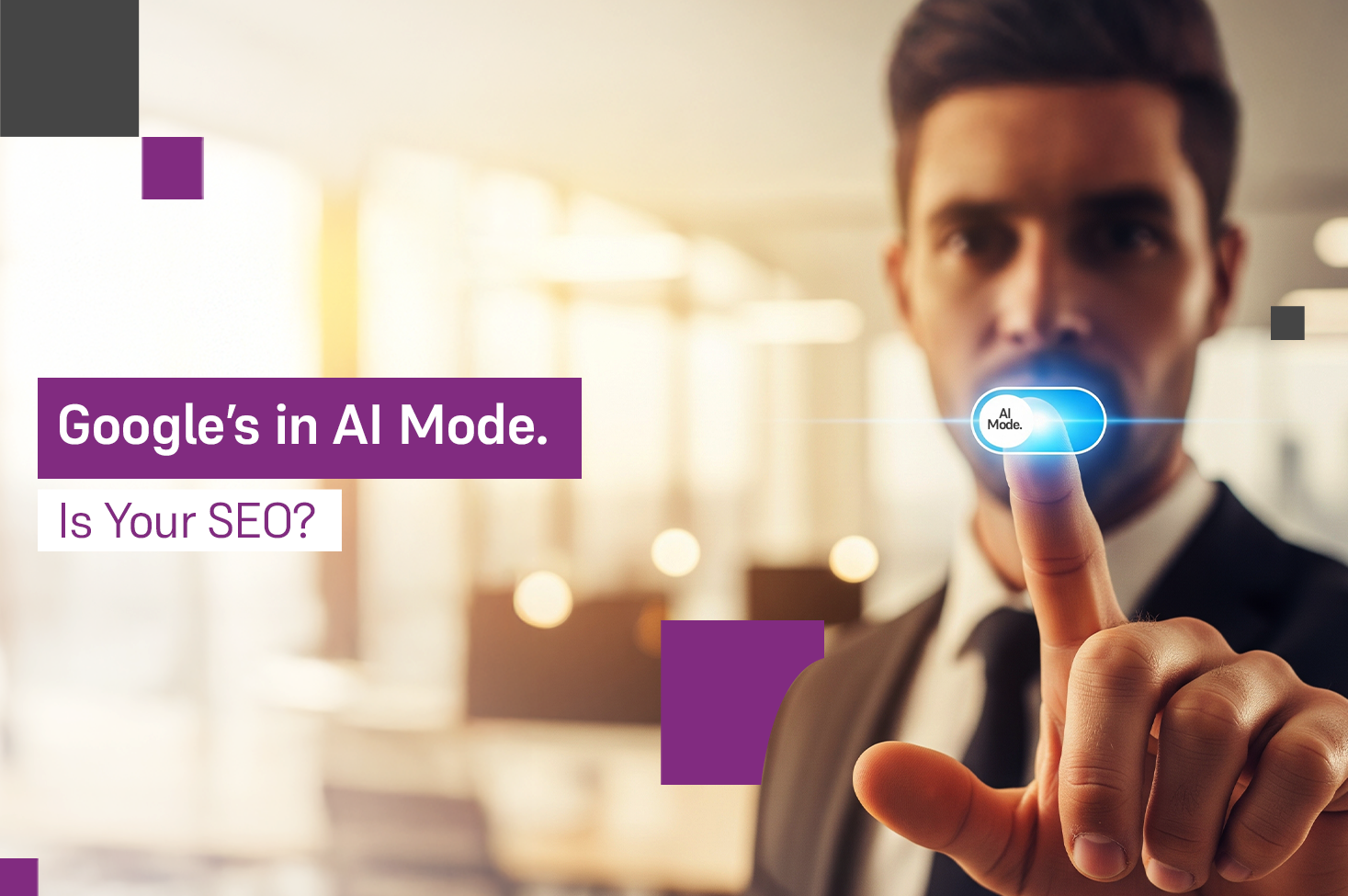Search as we know it is transforming. Google AI Mode, the next evolutionary leap in search, has moved from experiment to prime-time, shaking up how content is found, ranked, and experienced. Traditional SEO, which once focused solely on blue links and meta tags, now faces an AI-powered environment where the rules of the game are rewritten.
For SEO professionals, digital marketers, and content strategists, the new normal means learning what elements are foundational for SEO with AI, and understanding how AI will affect SEO on a day-to-day basis.
This post breaks down everything you need to thrive in the AI-powered search era: what Google AI Mode is, why it matters, the real impacts on SEO, and the must-have strategies and tools for 2025 and beyond.
What is Google AI Mode?
Google AI Mode is a smarter way to search. Instead of just matching keywords, it uses advanced AI, like Google’s Gemini model, to understand the meaning behind your question. It can process text, images, and even voice inputs to give you more relevant and complete answers.
You’ll notice AI Mode in the form of AI Overviews at the top of some search results. These summaries pull key information from trusted sources and help answer complex or multi-step questions quickly. You can also ask follow-up questions naturally, just like chatting with a person.
Key features include:
- Conversational, context-aware answers.
- Multi-modal results (text, images, even product cards).
- On-the-fly query decomposition for more complete answers.
- Integration with the Gemini model for deep understanding.
Traditional Search vs. AI Mode:
Traditional Google Search displays a list of “ten blue links.” In contrast, Google AI Mode puts a synthesized, AI-generated overview at the top, frequently reducing the space for organic links and making SEO a far more dynamic, intent-driven process.
Why Does AI Mode Matter for SEOs?
The arrival of Google AI Mode is far from cosmetic, it’s a structural change in how results are presented and how users interact with search.
- SERP Layout Shifts: The top of the search results page is now dominated by AI Overviews, which pull content directly from web sources. As a result, traditional organic links are pushed down, often below the fold.
- Zero-Click Search Explosion: Users get the answers they need right on the SERP, driving up “zero-click” outcomes and slashing organic site visits for many queries.
- Real-world Impact: Recent studies have shown an approximate 34.5% drop in organic clicks for queries featuring Google AI Mode, particularly for information-focused content.
- New Metrics Required: It’s no longer enough to track just rankings and traffic. Modern SEOs need to monitor where and how their content is cited or referenced within AI answers. Visibility is about presence in Overviews, not just position in the links.
Understanding what elements are foundational for SEO with AI is now non-negotiable for those who want to compete.
How Will AI Affect SEO?
The biggest changes can be summarized as follows:
- Fewer Blue Links: With Google AI Mode, organic listings are displaced further down the page. The “ten blue links” are now a shrinking minority.
- Zero-click Outcomes Surge: A significant chunk of user intent is now fulfilled directly on Google via AI answers, reducing click-through rates.
- Evolving Metrics: Instead of only tracking clicks, SEOs must now monitor AI citations, brand mentions in answers, and user engagement (e.g., dwell time).
- Content Depth & Authority: Google AI Mode prioritizes comprehensive, authoritative, and original content, thin or shallow pages rarely get cited.
- Structured Data is Critical: Schema and structured markup help AI engines accurately parse, interpret, and cite your content in overviews.
- Multi-format Matters: Google’s AI Mode is multi-modal. Sites with well-optimized images, video, and clear formatting are favored.
Google Search AI Overview impact on SEO is already significant. Here’s how:
- What Are AI Overviews?:
AI Overviews are summary answers presented above organic listings. They often cite multiple sources and condense key information, meaning the user’s need is met without visiting a website. - Discovery is Harder:
Brands and publishers report that it’s tougher for new or smaller sites to get discovered. Unless you’re cited within the AI answer, your organic link might be buried. - Traffic Trends:
Informational queries see the sharpest drops in impressions and clicks. The more your target query triggers an AI Overview, the more your organic performance is at risk. - Continuous Optimization is Essential:
With the AI constantly retraining and learning, your content’s eligibility for citation can change overnight. You need ongoing monitoring and a proactive approach.
What Elements are Foundational for SEO with AI?
| Element | Why It Matters | AI Optimization Tips |
| AI-Powered Keyword Research | Better captures user intent, discovers new topics | Use AI tools to spot trends, questions, and topic clusters |
| Content Creation & Authority | AI favors deep, expert, original content | Build depth, update regularly, cover semantically related subtopics |
| Structured Data & Markup | AI relies on schema to parse and cite sources correctly | Implement FAQ, How-to, Product, Review schema |
| Technical SEO | Crawlability and mobile UX impact discoverability | Ensure speed, indexability, and flawless structure |
| Link Building & E-E-A-T | Authority and trust signals are weighted more heavily | Pursue authoritative links, highlight real experts |
| User Experience Optimization | Engagement signals (time on page, interaction) guide AI ranking | Streamline navigation, improve clarity, design for interaction |
These elements answer an important question: what elements are foundational for SEO with AI? Each is a critical lever in making your content discoverable, and cited by Google AI Mode.
Tactical SEO Playbook for the AI Era
Navigating the world of SEO in the AI era calls for new tactics, sharper strategies, and a proactive mindset. This playbook highlights the essential moves every SEO professional should make to remain visible and competitive in Google AI Mode.
Content Strategy
- Build pillar pages with tightly interlinked topical clusters to boost authority.
- Write in a conversational, natural style; optimize for voice and follow-up queries.
- Use modular blocks: FAQs, summaries, quick answers for snippet-friendliness.
Technical & Visual SEO
- Mark up all relevant content with the right schema.
- Optimize every image for Google Lens and AI visual search, add alt text, captions, and context.
- Test mobile UX rigorously.
Brand & Authority Building
- Publish original research, cite primary sources, and display author expertise.
- Pursue mentions and citations on respected sites. Aim to be the “trusted answer” cited in AI Overviews.
Monitoring, Analytics, and New Metrics
- Move beyond just traffic. Track AI citations, brand mentions, and inclusion in Overviews using third-party tools.
- Measure engagement, dwell time, and retention.
- Set up alerts for significant shifts in visibility, including loss of citations.
Next-gen SEO Visibility with Tesseract
Enter Tesseract: a next-generation AI SEO visibility platform built for this new generation. Tesseract tracks your brand’s presence not only in Google AI Mode but across all major LLM-powered engines, including Gemini and ChatGPT.
How does it work?
- Tesseract integrates with live data feeds from Google, Gemini, and other LLMs.
- It dashboards your brand’s mentions, citations, and the context in which you appear.
- You get actionable, real-time insights to adapt your strategy quickly.
- Most importantly, Tesseract fills the gap left by Google Search Console, offering the full picture of your AI-driven search visibility, including citation, sentiment, and position within AI Overviews.
Why SEOs Need This Now:
As Google AI Mode and similar systems reshape discovery, having cross-platform, LLM-specific visibility is essential. SEOs who rely only on old-school traffic stats will fall behind.
Actionable SEO Checklist: Succeeding in Google AI Mode
Ready to take control of your search performance in the age of Google AI Mode? Use this actionable checklist to future-proof your SEO strategy and stay ahead as AI reshapes how users find and engage with your content.
- Conduct deep, AI-powered keyword and topic research.
- Structure your site for expert-level topical authority and interlinking.
- Audit and implement comprehensive structured data (FAQ, How-to, etc.).
- Monitor your inclusion and citation rates in AI-generated answers.
- Optimize content for conversational queries and follow-up intent.
- Invest in visual, interactive, and multi-format content.
- Test with tools like Tesseract to spot gaps in AI search visibility, across Google, ChatGPT, and Gemini.
The Future of SEO in the AI Era
Where is all this headed? Expect even deeper integration of Google AI Mode into every facet of search, across devices, formats, and user journeys. Search will become less about finding a link and more about satisfying intent instantly.
Agility will be your superpower. How will AI affect SEO in the future? It’ll reward those who experiment, monitor, and update strategies as models evolve. New platforms and tools will continue to emerge, so never stop learning.
Continuous learning, rapid tool adoption, and embracing change will define tomorrow’s SEO winners.
Summing Up
The challenge is real, but so is the opportunity. Google AI Mode is here, and it’s transforming what visibility means for brands, publishers, and SEOs alike. From understanding what elements are foundational for SEO with AI to tracking the Google Search AI Overview impact on SEO, the best path forward is to stay action-oriented.
Don’t cling to old tactics, adapt, measure, and invest in platforms that give you the real view of your presence across AI-driven search. Visibility in AI Mode is now the benchmark for success. The sooner you master this new era, the bigger your advantage.
Take action, stay agile, and let the future of AI-powered SEO work for you, before your competitors do.
FAQs
- What is Google AI Mode and how does it change traditional search results?
Google AI Mode uses advanced language models to generate conversational, multi-modal answers that appear at the top of search results. This shifts the focus from classic “blue link” listings to AI-generated summaries, often reducing organic visibility for many websites. - How will AI affect SEO strategies for content creators and brands?
AI will impact SEO by prioritizing authority, depth, and structured data, making it crucial for brands to focus on being cited within AI-generated answers. Monitoring brand mentions and optimizing for AI visibility are now as important as traditional keyword rankings. - What elements are foundational for SEO with AI in 2025?
Core elements include AI-powered keyword research, comprehensive and authoritative content, structured data implementation, strong technical SEO, diversified link building, and enhanced user experience signals that AI models can interpret. - What is the Google Search AI Overview impact on SEO performance?
Google Search AI Overviews often lead to higher zero-click search rates and fewer organic clicks for websites. This makes it essential to track citations, brand presence, and content relevance within AI-generated answers for sustained visibility. - How can tools like Tesseract help SEOs adapt to Google AI Mode?
Platforms like Tesseract provide real-time tracking of brand mentions and citations across AI-powered engines, offering actionable insights that go beyond traditional analytics. This enables SEOs to measure, manage, and maximize their presence in AI-driven search results.









